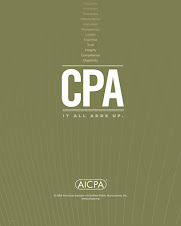 In Hollywood, accounting can seem like a pretty glamorous profession, or not.
In Hollywood, accounting can seem like a pretty glamorous profession, or not.Rick Moranis played Sigourney Weaver's accountant neighbor and admirer Louis Tully in the 1984 comedy classic "Ghostbusters." Possessed by a demonic ghost, Louis is transformed from a mild-mannered accountant into the "Keymaster" and needs the help of Bill Murray, Dan Aykroyd, Harold Ramis, Ernie Hudson and the rest of the ghost-busting crew (along with their Proton Packs). Moranis reprised the role in the 1989 sequel "Ghostbusters II" and hopefully will come out of retirement to appear in "Ghostbusters III," which is set to be released next year.







